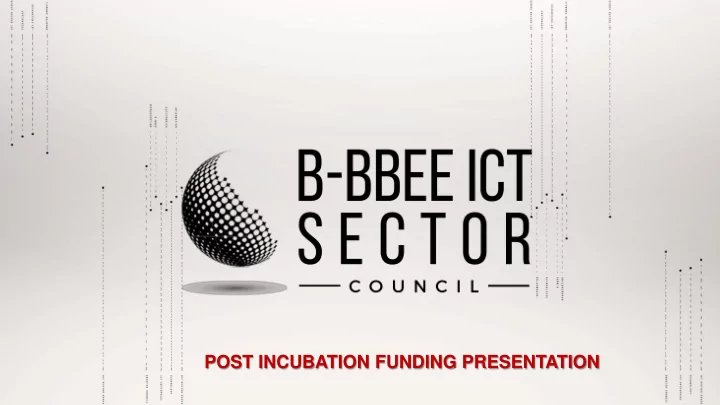

POST INCUBATION FUNDING PRESENTATION
Contents 1.Introduction 2. Incubation of the Council 3. Examination of Funding Models 4. Proposed Funding Model for the Council
Introduction MANDATE OF THE B-BBEE ICT SECTOR COUNCIL
The B-BBEE ICT Sector Council (The Council) has a mandate to oversee the effective implementation of the ICT Sector Code, a code established in terms of the Broad-Based Black Economic Empowerment Act of 2003 as amended by Act 46 of 2013. Transformation of the ICT B-BBEE ICT sector. B-BBEE Act 54 Codes of Good B-BBEE Sector Sector Code as of 2003 Practice Council A critical aligned growth imperative
INCUBATION OF THE B-BBEE ICT SECTOR COUNCIL
INCUBATION OF THE COUNCIL The Terms of Reference of the B-BBEE ICT Sector Council States that: “The Line Ministry shall fund the initial costs of setting up the Council for a period not longer than two years following its establishment” Section 9(1), Clause 6.7 of the Codes of Good Practice states that “The funding of the operations of Sector Charter Councils is a joint responsibility between the private (sector) and the Line Ministry responsible for that particular sector”. B-BBEE ICT Sector Council Terms of Reference Regulations provide for 2 ICT Sector + year incubation (2015-2017) Government to provide support 2018 Incubation funding provided Post and beyond by DTPS Incubation
FUNDING PRINCIPLES AND OPTIONS
FUNDING SUPPORT FOR THE COUNCIL The DTPS, as the Line Ministry, provide logistical and funding support for the first two years of the Council’s existence as part of its incubating obligation to the Council Council has successfully discharged its obligations in terms of amending the B-BBEE ICT Sector Code to align with the Codes of Good Practice and produced two Annual Monitoring Reports among other activities during its two years existence Adequate resourcing of the Council has reached a critical phase. Government (DTPS) has gone beyond the call of duty to incubate and sustain the work of the Council to date. Council can do much more to support the Sector in terms of compliance with the Code as well as embracing transformation in general if adequately resourced.
FUNDING PRINCIPLES In light of limited incubation provisions. Council has considered various funding models, considering the various pros and cons. We acknowledge that capacity to assist in resourcing the Council to execute its mandate will vary from enterprise to enterprise. A fundamental principle adopted is that Council maintain its independence and impartiality irrespective of value of contribution by sector members. Some stakeholders have long indicated that they are prepared to support the Council financially and otherwise. The Council had to organise itself in such a way as to ensure that there are proper governance systems in place to ensure that resources are properly managed and accounted for. Council also recognised that funding would only be made available on the basis of defined projects and activities aimed at supporting industry transformation initiatives. The Council 2018/19 budget estimates as articulated by the Chairperson was informed by a detailed strategic planning session.
FUNDING OPTIONS ANALYSIS • Pros: Predictable and consistent 100% Funding by DTPS • Cons: Not feasible and Inadequate to enable the Council to discharge its mandate • Pros : An established Fund for Sector Specific Initiatives, extending beyond the council narrow mandate Funding by Sector • Cons : Unpredictable. Reliability uncertain as many associations struggle Associations to sustain self. Administering the fund poses additional burden to Associations • Pros : • Consistent, reliable and aligned to compliance with the ICT Code. • Funding on a determined percentage of committed SED spend and therefore affordable Direct Funding by • Provides for “ skin in the game” of council programmes , thus creating a Measured Entities partnership of mutual value. • Transparent accounting and reporting systems supported by sound financial management capacity by the Council provides comfort. • Cons . We could not think of any
PROPOSED COUNCIL FUNDING MODEL
PROPOSED FUNDING MODEL FOR THE COUNCIL After extensive deliberations within Council and with other Stakeholders (DTI, B-BBEE Commission and DTPS) the Council concluded that: The Sector will fund the Council on a sliding scale, determined by the turnover of each company and relative recognized SED investment as per the ICT Sector Codes The contribution will be made as part of the Socio-Economic Development (SED) contribution, and the Measured Entity will be able to obtain points based on their contributions. The Funding Model prescribes a capped contribution of 0,015% of the Net Profit After Taxes (NPAT) as part of the SED contribution. Council will provide a formal certificate of contribution annually for verification purposes Additional funding provided to the Council outside the parameters of the Funding Model will not result in additional B-BBEE points. Government (DTPS) to provide funding on agreed terms and scale, taking into consideration diminishing funding across government All funding will be accounted for in the Audited Annual Financial Statements of the Council . The Model to be effective by April 2018, for the 2018/19 Financial Year .
Thank you Questions? Feel free to Email chairperson@ictsectorcouncil.co.za deputychair@ictsectorcouncil.co.za
Recommend
More recommend